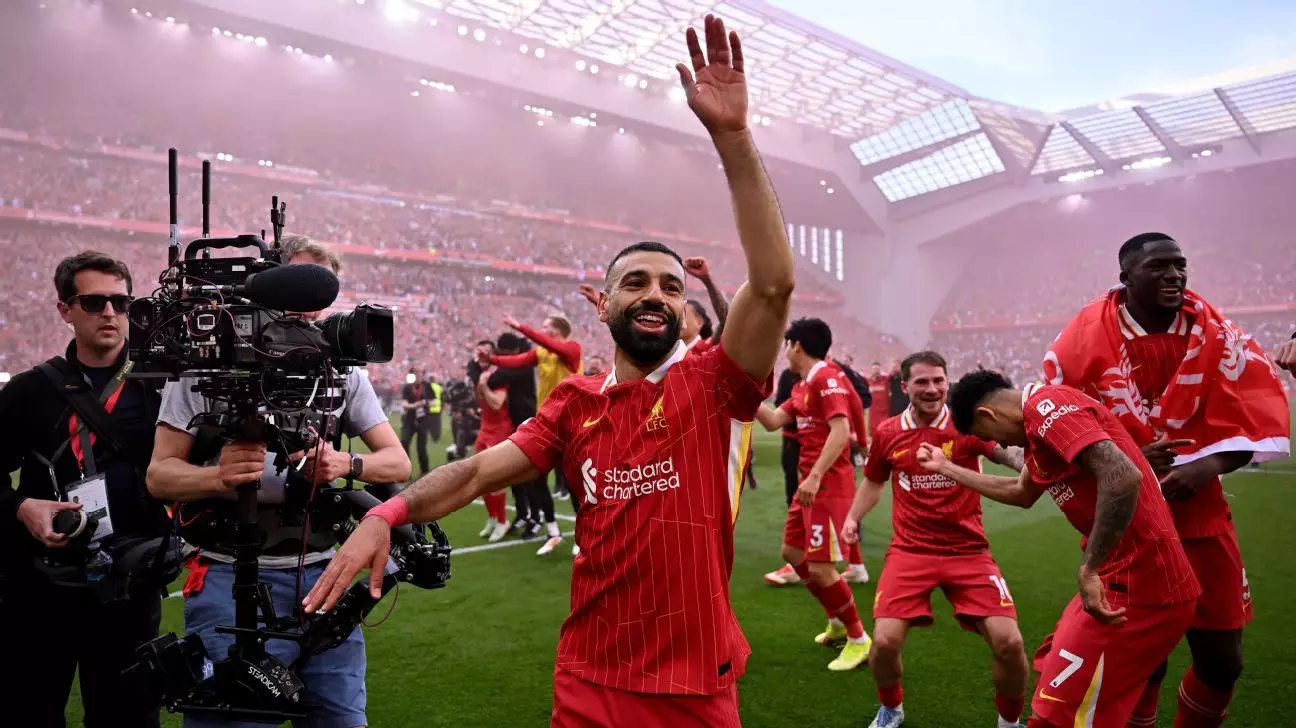As the 2024 Football Writers’ Association Player of the Year award approaches its announcement this Friday, the air is thick with anticipation and debate in the world of English soccer. This celebrated accolade has illuminated the careers of many greats since its inception in 1948. While last year’s recipient, Phil Foden, and past winners, like Mohamed Salah, stand as testaments to the award’s significance, this year presents a unique blend of talent and resilience across the Premier League. With teams battling fiercely and individual players stepping up amid challenges, the question of who deserves to be crowned this year’s standout stars opens the floor to compelling discussions among sportswriters.
The Argument for Mohamed Salah
It’s no stretch to assert that Mohamed Salah remains a prime contender for this year’s title. Consistency is the hallmark of excellence in soccer, and Salah embodies that standard. Leading the Premier League with both goals and assists places him firmly atop any statistical leaderboard, demonstrating an extraordinary blend of scoring prowess and playmaking ability. With Liverpool surging to the top of the table under the astute management of Arne Slot, Salah’s contributions have not only propelled his team toward a potential league title but have also overshadowed competitive greats in their pursuit of recognition.
Salah’s significance goes beyond numbers. The fact that he maintained such performance levels amid contract negotiations—a factor many believe could distract an average player—highlights his mental fortitude. This year, he has transformed challenges into motivation, rallying his teammates and asserting his influence on matches that matter most. When one factors in his integral role in securing match-winning goals, it becomes apparent he is not just a player; he is the heartbeat of Liverpool’s campaign.
Bruno Fernandes: The Unsung Hero
On the other side of the spectrum, we cannot overlook Bruno Fernandes, captain of Manchester United, who has stood as a pillar of resilience in what many critics call one of the club’s worst seasons. Amidst a season fraught with adversity and a team struggling near the relegation zone, Fernandes has dramatically defied expectations. Scoring 19 goals and assisting 18 in a baffling season shows that his influence extends far beyond the pitch.
Critics often questioned Fernandes’s leadership style and temperament, yet this season, he has evolved into a leader both on and off the pitch. He finds himself in a unique position—being the driving force for a side that has faltered and failed to meet historical standards. His determination to push through these setbacks encapsulates the characteristics one might expect from a Player of the Year. In a season where many opted to shrink from the challenge, Fernandes rose to the occasion, embodying what it means to lead a team through hardship.
The Value of Team Dynamics
While individual brilliance is celebrated, examining the undercurrent of teamwork becomes equally vital. Within the Liverpool squad, players like Virgil van Dijk and new signing Ryan Gravenberch have played transformative roles. Van Dijk, often hailed as one of the best defenders in the league, has been more than just a defensive wall; he is a leader who has steered the team through transitions with remarkable stability. Meanwhile, Gravenberch’s rise from the periphery to a central figure within Liverpool’s midfield has been nothing short of phenomenal. His initial struggles have transformed into pivotal performances, emphasizing the critical nature of adaptability in a competitive environment.
A large part of Liverpool’s success hinges not only on Salah’s attacking flair but also on the solidity provided by players like Van Dijk and Gravenberch. Together, they represent the essence of teamwork—where individual skills meld into a collective force that opposes any adversary, thus yielding greater success than individual talents could achieve alone.
Recognizing Broader Achievements
Inarguably, the spotlight tends to shine most brightly on the top scorers, but it’s crucial to appreciate pivotal contributions from those less heralded. Chris Wood’s incredible achievements with Nottingham Forest have garnered recognition worthy of praise. As a forward known more for his physical presence than flair, Wood has amassed 22 goal involvements, decisively impacting his team’s aspirations. Such accomplishments highlight the beauty of football as an ecosystem where every role, whether glamorous or gritty, contributes toward a collective goal.
As pundits assess the competitors for Player of the Year, it becomes clear that recognizing comprehensive contributions is essential to encapsulating the sport’s complexity. While Salah and Fernandes garner the headlines, the work of supportive players like Wood, or unsung midfield architects like Gravenberch cannot be overlooked. The essence of soccer extends beyond individual awards—it resides in the cohesive dance of ambitions and capabilities that turn champions into legends.
The richly woven tapestry of contributions throughout the Premier League not only enhances the contest for the Player of the Year but also elevates the narrative of soccer itself. In the end, it is the myriad influences that blend into the beautiful game that ultimately shapes the legacy each player leaves behind.

Leave a Reply